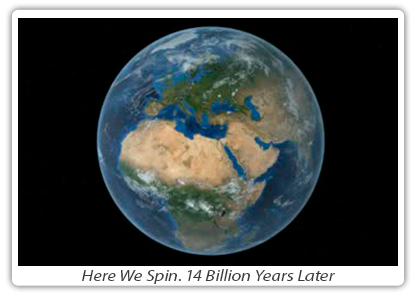Sometimes there are scientific discoveries so exciting that the urge to report it is irresistible.
There is this tiny point, smaller than an atom that exploded 14 billion years ago. The explosion lasted for less than one second. Then it stopped and started again at a slower speed. Eventually that explosion turned into our universe.
This initial explosion is called The Big Bang. Mostly theory until recently, scientists have now detected, measured and seen the first gravitational wave emerging from The Big Bang. It had certain unique characteristics: for one the speed at which it traveled was greater than the speed of light. Scientists call this inflation.
This is extraordinary because all of the laws of science are based on the idea that nothing travels faster than the speed of light. The speed of light sets the basic rule for all of measurement and understanding in our universe, until now. We now see the wave of inflation that traveled, however briefly, faster than the speed of light.
As a result we now have two sciences. One, where the speed of light is the absolute barrier. And another science where light travels faster than 186,000 miles a SECOND or the speed of light.
Also, as a result of measuring the gravitational wave, there is good evidence that the tiny point that led to The Big Bang is not the only point. There have been many points that have exploded resulting in many universes. It’s like “champagne bubbles in a glass.”
That makes a lot of sense.
Tiny points smaller than atoms have even been created in a lab.
What makes them explode? A RANDOM build up of energy. Random means you can’t determine when or where it will show up. But when it does, the tiny points explode and the result is a universe.
What does this suggest? Possibly that at the very beginning of everything existence was a random unplanned moment. After all this, the universe is a creature of a random event not planned for.

What came before the point? Other points. What came before the points? Energy. What came before energy? There is no answer, because energy is random. It has no home. It has no root. Time is a product of random energy, not a cause of it. (This is called quantum fluctuations.)
I feel comfortable with this explanation for two reasons. One, we finally have initial evidence for a period of intense inflation right after The Big Bang, and two, The Big Bang was a random, unplanned act.
Over fourteen billion years our particular universe has gone from a random, unplanned nothing to a steam house full nuclear fires, galaxies, stars, moons, planets, and our gentle perfectly pitched earth. Pretty good for going from random nothingness, absent even the property of time, to an atomic clock at The National Institute for Standards and Technology that will not lose or gain one second in 3.7 billion years.
